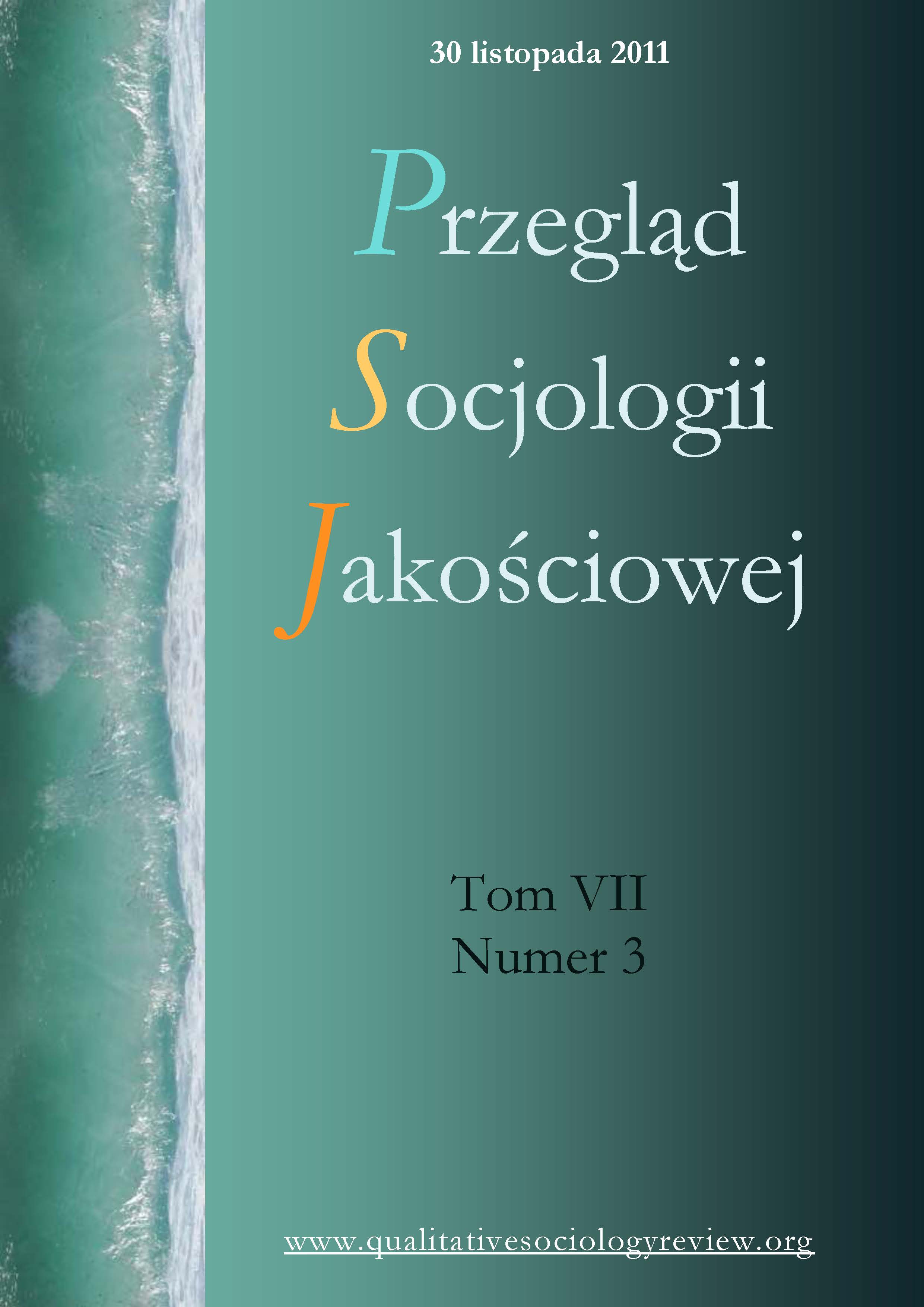Proces adaptacji użytkownika do środowiska online
DOI:
https://doi.org/10.18778/1733-8069.7.3.03Słowa kluczowe:
użytkownik komputera, użytkownik Internetu, adaptacja, środowisko online, Internet, obiektywny kontekst znaczenia, interakcje face-to-device, typifikowanie, przyjmowanie roli, intersubiektywność, przekładalność perspektyw, tożsamość, fenomenologiaAbstrakt
Artykuł ten ma charakter komunikatu z badań dotyczących szeroko rozumianego korzystania z Internetu. Jednym z procesów towarzyszących stawaniu się użytkownikiem Internetu jest proces adaptacji do środowiska komunikowania online.
W badaniu zastosowana została strategia badawcza łącząca elementy podejścia biograficznego oraz metodologii teorii ugruntowanej. Podstawę przeprowadzonych analiz stanowił materiał badawczy w postaci narracji, wywiadów swobodnych, materiałów zastanych oraz zapisów z obserwacji.
Pobrania
Bibliografia
Bubas, Goran (2001) "Computer mediated communication theories and phenomena: Factors that influence collaboration over the Internet". Referat zaprezentowano podczas trzeciej CARNet Users Conference, 24–26 września, Zagreb, Chorwacja.
Google Scholar
Chesher, Chris (2001) "Ontologia domen cyfrowych". S. 145–166 w Widzieć, myśleć, być. Technologie mediów, pod redakcją A. Gwóźdź. Kraków: Universitas.
Google Scholar
Crabtree, Andy (2000) "Remarks on the social organization of space and place". Journal of Mundane Behavior 1(1): 25–44. Dostęp 10 października 2007. online: http://mundanebehavior.org/issues/v1n1/crabtree.htm
Google Scholar
Curry, Michael R. (1996) "Cyberspace and cyberplaces: rethinking the identity of individual and place". Referat zaprezentowano podczas 20th International Association for Mass Communication Research (AIERI/IAMCR/AIECS) conference, 18–22 sierpnia, Sydney, Australia.
Google Scholar
Curtis, Pavel (1992) "Mudding: Social Phenomena in Text-Based Virtual Realities". Dostęp 11 lipca 2005. http://gel.msu.edu/classes/tc848/papers/curtis.mudding.social.phenomena.in.text0based.virtual.realities.pdf
Google Scholar
Davis, Boyd H. i Jeutonne P. Brewer (1997) Electronic Discourse. Linguistic Individuals in Virtual Space. Albany: State University of New York Press.
Google Scholar
Garfinkel, Harold (1967) Studies in Ethnometodology. Englewood Cliffs: Prentice Hall Inc.
Google Scholar
Giddens, Anthony (2001) Nowoczesność i tożsamość. "Ja" i społeczeństwo w epoce późnej nowoczesności. Przełożyła A. Szulżycka. Warszawa: Wydawnictwo Naukowe PWN.
Google Scholar
Goffman, Erving (1972) Relations in Public: Microstudies of the Public Order. Harmondsworth: Penguin.
Google Scholar
Hatch, Mary Jo (2002) Teoria organizacji. Przełożył P. Łukow. Warszawa: Wydawnictwo Naukowe PWN.
Google Scholar
Heim, Michael (2000) The Feng Shui of Virtual Environments. Referat zaprezentowano podczas The International Conference "Virtual Reality Software Technology 2000" (VRST 2000), the ACM Symposium on Virtual Reality Software & Technology on October 24, 2000 in Seoul, Korea. Dostęp kwiecień 2006. http://dcmrg.english.ucsb.edu/research/Heim.FengShuiVirtualEnviron.html
Google Scholar
Hewitt, John P. (2000) Self and Society. A Symbolic Interactionist Social Psychology. Boston: Allyn & Bacon.
Google Scholar
Kluszczyński, Ryszard (2001) Społeczeństwo informacyjne. Cyberkultura. Sztuka multimediów. Kraków: Wydawnictwo Rabid.
Google Scholar
Kryszczuk, Maciej (2002) "Społeczne aspekty nowych mediów", Studia Socjologiczne 2(165): 107-125.
Google Scholar
Landow, George (1992) Hypertext: The Convergence of Contemporary Literary Theory and Technology. Baltimore: Johns Hopkins University Press.
Google Scholar
Levinson, Paul (1999) Miękkie ostrze. Naturalna historia i przyszłość rewolucji informatycznej. Przełożyła Hanna Jankowska. Warszawa: Wydawnictwo Literackie MUZA SA.
Google Scholar
Mitchell, William (1995) City of Bits: Space, Place, and the Infobahn. Cambridge, MA: MIT Press.
Google Scholar
Pace, Steven (2004) "A Grounded Theory of the Flow Experiences of Web Users." International Journal of Human-Computer Studies 60(2004): 327– 363.
Google Scholar
DOI: https://doi.org/10.1016/j.ijhcs.2003.08.005
Papacharissi, Zizi, i Alan Rubin (2000) "Predictors of Internet Use." Journal of Broadcasting and Electronic Media 44(2): 175–96.
Google Scholar
DOI: https://doi.org/10.1207/s15506878jobem4402_2
Puddephatt, Antony J. (2005) "Mead Has Never Been Modern: Using Meadian Theory to Extend the Constructionist Study of Technology." Social Epistemology 19(4): 357–380.
Google Scholar
DOI: https://doi.org/10.1080/02691720500145571
Puddephatt, Antony i Aaron Segaert (2005) "Mead vs. Chomsky", Perspectives. Newsletter of the ASA Theory Section, vol. 28, No. 1: 8-11.
Google Scholar
Reid, Elizabeth (1992) "Electropolis: Communication and Community on Internet Relay Chat." Intertek Vol. 3.3: 7–15.
Google Scholar
Rheingold, Howard (1993) The Virtual Community: Homesteading on the electronic frontier. Reading, MA: Addison-Wesley.
Google Scholar
Sitarski, Piotr (2002) Rozmowy z cyfrowym cieniem. Model komunikacyjny rzeczywistości wirtualnej. Kraków: Wydawnictwo Rabid.
Google Scholar
Spitzberg, Brian H. (2001) "Mediated Communication Competence." S. 399-420 w Human Communication: Motivation, Knowledge and Skills, pod redakcją S. Morreale, B.H. Spitzberg, K. Barge. Belmont, CS: Wadsworth.
Google Scholar
Strate, Lance (1999) "The Varieties of Cyberspace: Problems in definition and delimitation." Western Journal of Communication 63(3): 382–412.
Google Scholar
DOI: https://doi.org/10.1080/10570319909374648
Strauss, Anselm (1997) Mirrors and Masks. In Search for Identity, New Brunswick, N.J.: Transaction Publishers.
Google Scholar
Taylor, Stephanie i Karen Littleton (2006) “Biographies in Talk: A narrativediscursive research approach.” Qualitative Sociology Review 2(1): 22-38. Dostęp kwiecień 2006. http://www.qualitativesociologyreview.org/ENG/Volume3/QSR_2_1_Taylor_Littleton.pdf
Google Scholar
DOI: https://doi.org/10.18778/1733-8077.2.1.03
Ten Have, Paul (1999) "Structuring Writing for Reading: Hypertext and the Reading Body. " Human Studies 22: 273–298.
Google Scholar
DOI: https://doi.org/10.1023/A:1005496619385
Vieta, Marcelo (2005) "Interactions through the screen. The interactional self as a theory for internet-mediated communication", Dostęp 4 kwietnia 2007. http://ir.lib.sfu.ca/retrieve/188/etd0365.pdf
Google Scholar
Wilk, Eugeniusz (2000) Nawigacje słowa. Strategie werbalne w kulturze audiowizualnej. Kraków: Rabid.
Google Scholar
Zhao, Shanyang (2004) "Consociated contemporaries as an emergent realm of the lifeworld: extending Schutz’s phenomenological analysis to cyberspace." Human Studies 27(1): 91–105.
Google Scholar
DOI: https://doi.org/10.1023/B:HUMA.0000012246.33089.68
Pobrania
Opublikowane
Jak cytować
Numer
Dział
Licencja

Utwór dostępny jest na licencji Creative Commons Uznanie autorstwa – Użycie niekomercyjne – Bez utworów zależnych 4.0 Międzynarodowe.














